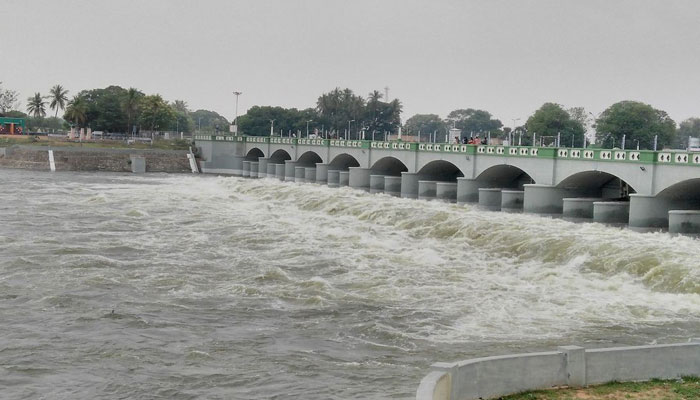TRENDING TAGS :
Cauvery verdict: SC reduces TN's share of disputed water
New Delhi: The Supreme Court has given its verdict to release 177.25 TMC of the Cauvery water for Tamil Nadu on Friday and stated that Karnataka will get an additional 14.75 TMC of water.
The apex court has also announced that 20 TMC of ground water in Tamil Nadu had not been accounted for and needed to be seen.
Considering the water scarcity in Bengaluru while delivering the cauvery judgment the SC has strictly denied any deviance to be shown by any state to the order.
The verdict came on the a batch of cross petitions by Tamil Nadu, Karnataka, Kerala and Puducherry challenging the 2007 Cauvery River Water Disputes Tribunal award.
The bench of Chief Justice Dipak Misra, Justice Amitava Roy and Justice A.M. Khanwilkar announced the decision which they had kept stored on September 20, 2017 after hearing the matter for 29 days spread over eight months.
SC made it clear that increase in share of Cauvery water for Karnataka by 14.75 TMC has been done keeping in view the fact that there is an increased demand of drinking water by Bengaluru and also for many industrial activities.
What the lawyer A Navaneethakrishnan said:
- We believe in verdict of the court and respect it.
- Surely, this is not enough. We have raised the shortfall of water with Union Minister Nitin Gadkari who have two plans to address the issue, one of which is linking river Godavari with Kallanai.
- Originally awarded 192 TMC water to Tamil Nadu has been reduced with SC order.
- 14.75 TMC extra water has been given to Karnataka to provide drinking water to Bengaluru city.
- We hope that TN govt will take appropriate steps.
Also Read: After corruption-free govt, we will ensure ‘sabka vikas’, says Amit Shah
What had happened before?
Both Tamil Nadu and Karnataka had approached the top court soon after the 2007 award was announced, assailing it on several counts. It is to be mentioned that in 2007, the Cauvery Water Disputes Tribunal (CWDT) had ordered 419 TMC for Tamil Nadu, 270 TMC for Karnataka, 30 TMC for Kerala and seven TMC for Puducherry.
The Centre had opposed the top court adjudicating over the Cauvery River Water Dispute Award, contending that the appeals by the three states and the union territory of Puducherry were not maintainable as under the Constitution's Article 262 read with Section 11 of the Inter-State River Water Disputes Act, 1956, the top court was barred from hearing the appeals.
The top court had, however, said, "Prima facie we feel that Article 262 does not say that (river water) tribunal award is so sacrosanct that Supreme Court can't look into it."
The Cauvery River Water Dispute Tribunal was set-up on June 2, 1990 and gave its final report on February 5, 2007, which was challenged before the top court by all the three states and the union territory.
Karnataka had told the court that 1924 agreement between the then British province of Madras and the princely State of Mysore could not be the basis of sharing Cauvery river water between the present day Karnataka and Tamil Nadu and present day needs must taken into account.
It said that water sharing was decided on the basis of 1890 and 1924 agreement without determining equitable share and its apportionment.
You may also Read: Former Facebook India head Umang Bedi joins Dailyhunt as President
However, Tamil Nadu on the other hand had contended that Tribunal's award was erroneous as it allocated 192 TMC of water taking into account cultivation of just one crop as against the prevailing two crops in the State.
Seeking more water than that was allocated by the tribunal, it had told the court that in the absence of Cauvery Water Management Board, it has never got its allocated share.
Seeking to put in place a mechanism for the effective implementation of the Cauvery award including Cauvery Management Board, Tamil Nadu had, however, resisted the suggestion that the issue of framing a scheme for setting up of such a board be left to the wisdom of Parliament.
It rejected Karnataka's stand that allocation of water could be determined only at the end of the crop season or at the end of the water year.
Upon the conclusion of the hearing on November 20, the court had primarily asked Tamil Nadu and Karnataka to submit written notes which would include the question of law by Karnataka, opposition to the proposition of question of law by Tamil Nadu, significant aspects of 2007 tribunal award and the principles that were invoked by the tribunal, the genesis of the issues and other dimensions.



